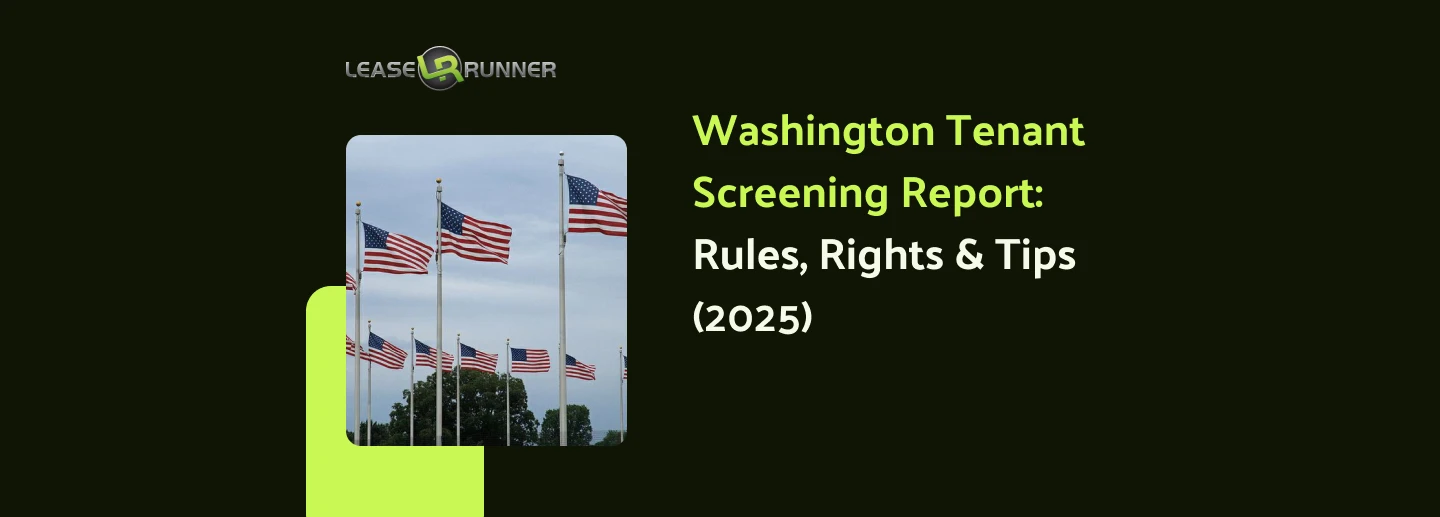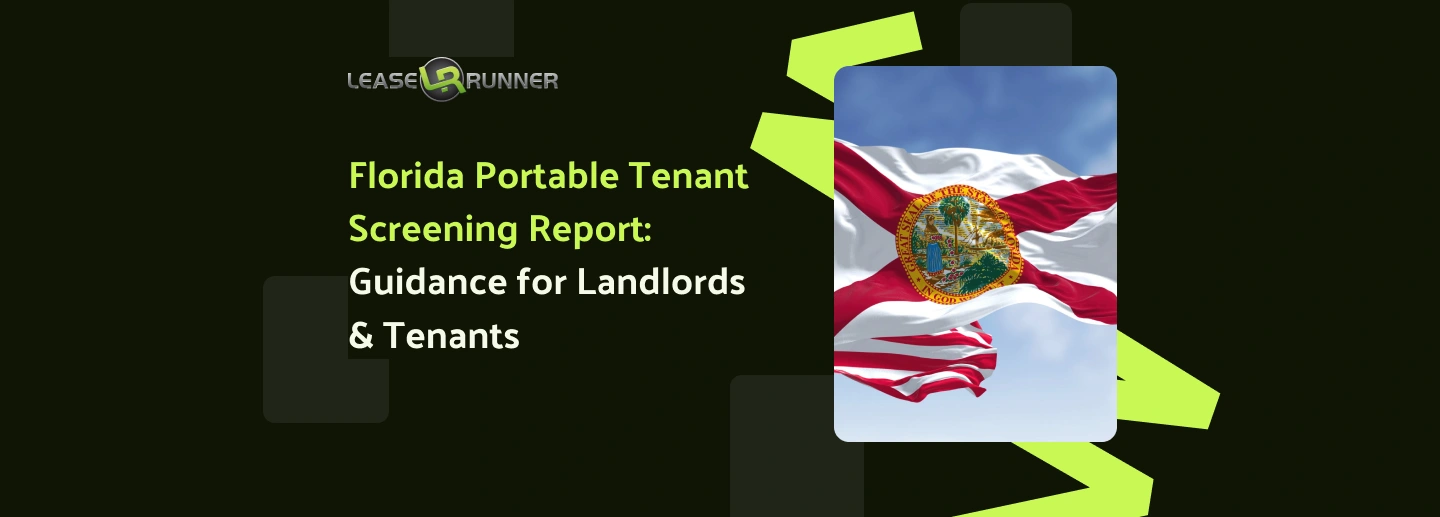
Renting in Washington comes with a unique set of rules, and one of the most important is the Portable Tenant Screening Report. This policy aims to protect renters from excessive application fees while helping landlords make informed decisions. This article will guide you through everything you need to know about Washington portable tenant screening report!
Overview of Washington Tenant Screening Report
Tenant screening Washington state laws have changed to make the process more transparent, especially with the introduction of the Portable Tenant Screening Report (PTSR). This new approach is meant to save renters money and simplify applications, but it also brings new rules that both tenants and landlords need to understand.
What Is a Portable Tenant Screening Report?
A Portable Tenant Screening Report (PTSR) is a renter’s screening report that can be reused for multiple rental applications. Instead of paying a new fee every time a background check is required, tenants can share the same report with several landlords. In Washington, a PTSR is legally recognized under the official name comprehensive reusable tenant screening report. This means it is a legally valid, full screening document that can be used across different rental applications without requiring tenants to undergo duplicate checks or pay repeated fees.
While portable reports aim to be more convenient, some landlords worry about outdated or incomplete information. Therefore, always update your Washington portable tenant screening report!
For example: If Alina applies to three apartments in Seattle, she can use the same Washington portable tenant screening report for all three landlords. Instead of paying three separate screening fees, Alina submits one report, and each landlord reviews the same verified credit, rental, and background information. This shows how pay once share multiple landlords works in practice.
Washington Tenant Screening Laws You Must Know (RCW 59.18.257)

Washington tenant screening laws
Washington’s Residential Landlord-Tenant Act (RCW 59.18.257) establishes clear and transparent rules for the rental application process. The law balances landlords’ interests with tenant rights in Washington State, ensuring the process is fair and legally compliant.
RCW 59.18.257 Overview
RCW 59.18.257 is a key section of Washington’s Residential Landlord-Tenant Act that regulates tenant screening practices. This statute defines what information landlords can request, how screening fees must be handled, and the rights tenants have during the rental application process.
The law sets out:
- Limits on screening fees that landlords can charge and the requirement to provide receipts.
- Disclosure obligations, where landlords must inform applicants about what information will be used in the screening and the criteria for approval or denial.
- Tenant rights regarding screening reports, including the ability to dispute inaccurate or outdated records.
- Recognition of Portable Tenant Screening Reports (PTSRs)—also called Comprehensive Reusable Tenant Screening Reports (CRTSRs)—which landlords must accept under certain conditions.
Overall, the statute aims to increase transparency, fairness, and tenant protections during the rental application process.
Disclosure and Screening Fee Rules
- Written disclosure required: Before collecting any fee, landlords must provide tenants with written screening criteria. These criteria typically cover income requirements, rental history, criminal background checks, and credit history check Washington rentals. Landlords must also disclose the source of the credit report and inform tenants of their right to receive a copy.
- Receipts for fees: Landlords must give applicants a receipt if they charge a screening fee.
- Dispute rights: If a consumer reporting agency is used, tenants must be informed that they can contact the agency directly to dispute inaccurate information.
- Online listings: If a landlord advertises rentals through a website, the site must clearly disclose the landlord’s policy on accepting or rejecting comprehensive reusable tenant screening report Washington (CRTSRs).
Tenant Rights to Portable Tenant Screening Reports
Understanding your tenant rights in Washington State is vital.
- 30-day validity: A PTSR/CRTSR is valid if issued within the past 30 days by a reputable consumer reporting agency. This timeframe is essential for a valid Washington portable tenant screening report.
- No duplicate fees: Landlords cannot charge a new screening fee when a tenant provides a valid CRTSR. This is a core protection for tenants under landlord-tenant laws Washington.
- Clear policies: Landlords must state upfront whether they accept or decline CRTSRs.
- Access to reports: Tenants have the right to receive a copy of their report. For tips on how to pass a background check, which is a key part of the screening report, see our blog: here.
Limits on Screening Information
Washington restricts how screening data may be used. For example, landlords may not consider criminal records older than seven years when evaluating applications. This ensures applicants are not unfairly penalized for outdated history.
Adverse Action Notice Requirements
When a landlord denies a rental application, increases the deposit, or adds special conditions based on a tenant’s Washington portable tenant screening report, they must provide an Adverse Action Notice. This notice must:
- State the specific reasons for the decision.
- Identify the consumer reporting agency used.
- Inform tenants of their right to dispute inaccurate or incomplete information.
Landlord Liabilities and Penalties
Failure to comply with RCW 59.18.257 carries consequences:
- Landlords who do not provide the required disclosures or fail to issue an Adverse Action Notice may face penalties.
- Tenants can pursue legal remedies, including damages of up to $100 plus attorney’s fees.
- Landlords are prohibited from discriminating against tenants who present a valid PTSR.
Additional Note: RCW 59.18.257 is part of a broader body of landlord-tenant laws in Washington. To ensure full compliance, both landlords and tenants should refer to the full text of the law and seek legal advice washington portable tenant screening if necessary.
Benefits of Portable Tenant Screening Reports in Washington
PTSRs are designed to make the rental process smoother for everyone.
For Renters
The main perk of using a Portable Tenant Screening Report (PTSR) is the chance to save on rental application fees since renters can reuse the same background check for apply to multiple rentals with one report instead of paying each time. This also means no more repetitive paperwork, making the process more straightforward.
Plus, tenants can check their reports for accuracy before submitting them, ensuring everything is correct. Overall, having a ready-to-go Washington portable tenant screening report helps renters apply for properties more smoothly and efficiently.
For Landlords
PTSRs are beneficial for both renters and landlords alike. They simplify the screening process by delivering a comprehensive report that aligns with Washington tenant screening laws, meaning landlords no longer have to juggle various screening services. This pre-screening approach helps speed things up and makes the entire experience more seamless for everyone involved. For landlords concerned about how long tenant screening takes, a PTSR can be a great solution.
Moreover, Washington portable tenant screening report law requires the acceptance of valid PTSRs, which helps reduce potential disputes over rental application fees Washington. As a result, landlords can feel more assured when deciding on matters like security deposits and any additional rental terms, thanks to these standardized and thorough screenings.
That said, some landlords worry about outdated or incomplete reports, making it important to evaluate PTSRs carefully.
How to Obtain a Portable Tenant Screening Report in Washington?

To understand how to get portable tenant screening report in Washington, follow these steps.
- Choose a state-approved screening company – Not all background check services qualify as PTSRs under Washington law. For example, a reliable service like LeaseRunner PTSR can provide a compliant report.
- Complete the application – Tenants provide their information, including rental history, credit details, and criminal background (if applicable).
- Receive the report – Once processed, renters get a copy they can submit to multiple landlords.
- Confirm acceptance with landlords – While landlords are required to accept valid PTSRs, they may still have additional application steps.
This process highlights how portable tenant screening works in Washington and helps streamline the entire application process.
How Landlords Should Evaluate PTSRs under Washington Law
Landlords in Washington must accept a valid PTSR, following these criteria:
- Check the date: Reports must be recent (usually within 30 days) to ensure accuracy.
- Review key details: Look at credit scores, rental history, and any criminal records that are legally allowed to be considered.
- Verify the source: Make sure the report comes from a compliant screening provider.
If a landlord chooses not to accept a valid PTSR, they must provide a written reason - deny rental application letter, explaining why. Otherwise, they could face legal issues.
Landlord Responsibilities and Legal Obligations
Under RCW 59.18.257, Washington places clear legal duties on landlords to keep the tenant screening process both fair and transparent. These responsibilities include:
- Transparency: Landlords must provide written disclosure of screening criteria before collecting any application fee, so applicants know the standards upfront.
- Cost Regulation: Fees must reflect actual costs of screening (e.g., consumer reporting agency charges) and cannot be used for profit.
- Fairness and Non-Discrimination: Compliance with federal and state fair housing laws is mandatory, including protections for income sources such as housing vouchers.
- Adverse Action Notices: If denying an application, landlords must issue a written notice stating the reason and informing applicants of their right to dispute errors.
- Data Protection: Sensitive information collected must be securely stored and used only for screening purposes.
Failure to follow these rules can result in fines and legal consequences, making compliance not just a legal duty but also a safeguard against liability. This is an important part of landlord tenant laws Washington that every property owner should understand.
Washington Portable Tenant Screening Report vs. Other States: Oregon and California
Portable or reusable tenant screening reports are gaining traction, but the rules differ by state. Comparing Washington with Oregon and California highlights these variations:
- Washington (RCW 59.18.257): Landlords must disclose their policy on Comprehensive Reusable Tenant Screening Reports (CRTSRs). They may accept or reject them at their discretion, but cannot charge duplicate fees if they do accept.
- Oregon (ORS 90.295): Landlords must disclose screening criteria and refund fees if no screening occurs. However, Oregon does not mandate a formal portable report system like Washington’s CRTSR.
- California (AB 2559): California requires landlords to accept a valid Portable Tenant Screening Report (PTSR) less than 30 days old, unless they provide written justification for refusal. This makes the renter protections stronger than in Washington or Oregon.
In addition, Illinois allows tenants to use Illinois portable tenant screening reports for multiple rental applications. While the state does not have a formal CRTSR law like Washington, landlords generally accept reports issued by reputable screening agencies, helping renters save on repetitive application fees.
In short, Washington follows a “disclose and decide” model, giving landlords discretion, while California enforces a stricter “must accept or explain” rule that empowers renters more strongly.
Common Red Flags About Portable Tenant Screening in Washington
Since Portable Tenant Screening Reports (PTSRs) are still a new concept in Washington, both landlords and tenants often have misconceptions. Here are some of the most common red flags to watch out for:
- PTSRs are less reliable than landlord-run screenings → In reality: PTSRs use the same professional background check services as traditional screenings. The only difference is that tenants control the report and can share it with multiple landlords, ensuring consistency and reducing duplicate fees.
- Tenants can hide negative rental history with a PTSR → In reality: PTSRs include credit history, rental history, and criminal background details, just like traditional reports, so landlords still receive the full picture.
- PTSRs are valid for only one landlord or property → In reality: A PTSR is reusable for multiple rental applications. In Washington, they are officially recognized as Comprehensive Reusable Tenant Screening Reports (CRTSRs).
- All landlords in Washington must accept any PTSR → In reality: Landlords must accept valid PTSRs issued within the past 30 days, but they can still apply their own rental criteria. If they deny a rental application letter, they are required to provide a written denial letter explaining the reason.
Bottom Line
The rental process in Washington has evolved, and staying informed is the best way to make it work in your favor. Whether you're a tenant or a landlord, understanding Washington tenant screening laws is crucial. Keep reading LeaseRunner for expert insights on Washington portable tenant screening report and landlord best practices!
FAQs
Q1: What is a prospective tenant?
A prospective tenant is someone who is interested in renting a property and is in the process of applying for the rental. This includes anyone who submits an application or expresses interest in renting a home or apartment.
Q2: How do I get a Portable Tenant Screening Report (PTSR)?
To get a Portable Tenant Screening Report (PTSR), tenants need to use an approved screening service.
- Choose a state-approved background check company that offers PTSRs.
- Fill out the application with your personal details, rental history, and credit information.
- Once processed, you’ll receive the screening report, which can be used for multiple rental applications.
Q3: Who pays for the Portable Tenant Screening Washington State?
The tenant typically pays for the PTSR, just like with traditional screenings. However, with a PTSR, they only need to pay once share multiple landlords and the report can be used for multiple applications.


One Report. Zero Extra Fees.
Share your verified Washington Portable Tenant Screening Report with multiple landlords — no extra costs, no extra hassle.







